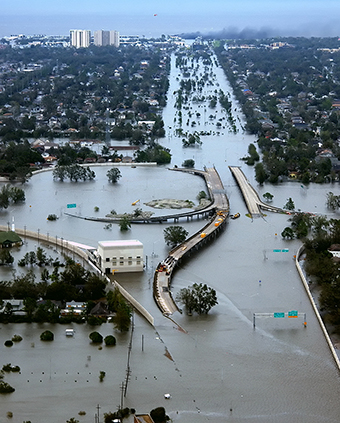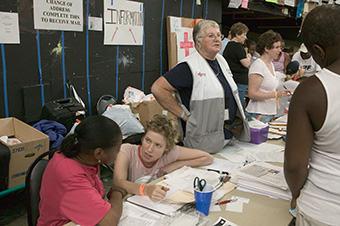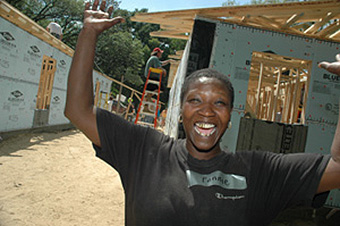By Aaron Weaver
Aug. 28, 2005, should have been a music-filled Sunday morning at St. Charles Avenue Baptist Church in New Orleans. The congregation was scheduled to sing its top 10 favorite hymns. Instead, that Sunday turned out to be a different kind of Sunday.
With most members bracing for Hurricane Katrina, predicted to hit within a matter of hours, just four parishioners showed up. They huddled together with their pastor, Steven Meriwether, and sang a hymn, read Scripture and prayed.
Early the next morning, Aug. 29, Hurricane Katrina struck the Gulf Coast, making landfall first in southeast Louisiana, causing severe destruction for 400 miles from central Florida all the way to Texas.
 When the death toll was tallied, more than 1,800 were dead — nearly 1,600 in Louisiana, the product largely of the systematic failure of New Orleans’ levees during the storm surge. Eighty percent of the city nicknamed “The Big Easy” was under water to some degree with low-lying areas like the Ninth Ward in a state of utter devastation, where survivors retreated to rooftops to escape the rising waters.
When the death toll was tallied, more than 1,800 were dead — nearly 1,600 in Louisiana, the product largely of the systematic failure of New Orleans’ levees during the storm surge. Eighty percent of the city nicknamed “The Big Easy” was under water to some degree with low-lying areas like the Ninth Ward in a state of utter devastation, where survivors retreated to rooftops to escape the rising waters.
Ten years later, one Baptist group is reflecting on Hurricane Katrina, which is remembered as the most expensive natural disaster in United States history with total property damage alone estimated at $108 billion. The coastal areas were hit the hardest as boats, barges, buildings, bridges, cars and houses were all washed miles inland. Roughly 90,000 square miles were affected by Katrina, and hundreds of thousands of Americans were displaced from their communities — many never to return.
Meriwether rode out Katrina in a concrete condo with one of his deacons and two of her elderly friends. They survived and the church did, too. Over the next two years, St. Charles hosted more than 300 volunteers, including many Cooperative Baptists, who gutted dozens of homes and rebuilt several others, notably constructing the first complete house in the Lower Ninth Ward.
The Cooperative Baptist Fellowship deployed teams of disaster responders in the immediate aftermath of Katrina to make assessments. A team sent to Hattiesburg, Miss., worked alongside University Baptist Church to set up a relief and distribution center in the church’s back parking lot in a city lacking power and access to basic supplies needed to survive.
Other teams were disbursed to Alabama and Louisiana to begin the Fellowship’s multi-year recovery efforts. Reid Doster, a Cooperative Baptist minister and pastoral counselor in Louisiana, was hired to help coordinate the Fellowship’s initial disaster response work, and David Harding, CBF’s international disaster response coordinator, provided leadership as well.
 This protracted effort involved individuals from all corners of the Fellowship, including pastors, laity, state/regional leaders as well as national staff, field personnel and chaplains. Skilled Cooperative Baptist lay leaders like Drayton Sanders of Georgia headed to Louisiana to offer medical treatment and CBF-endorsed chaplains like Stan Campbell ministered to U.S. military personnel deployed for Gulf Coast cleanup.
This protracted effort involved individuals from all corners of the Fellowship, including pastors, laity, state/regional leaders as well as national staff, field personnel and chaplains. Skilled Cooperative Baptist lay leaders like Drayton Sanders of Georgia headed to Louisiana to offer medical treatment and CBF-endorsed chaplains like Stan Campbell ministered to U.S. military personnel deployed for Gulf Coast cleanup.
Cooperative Baptists like Roy Peterson and Robert Sproles saw the images of death, destruction and despair and were compelled to act, traveling from Little Rock, Ark., to Hattiesburg with a truck full of tools and looking to lend a helping hand. They would return to provide relief to Katrina victims many more times, leading teams from their church, Little Rock’s Second Baptist Church, doing so alongside CBF of Arkansas and its coordinator, Ray Higgins, and disaster response coordinator, Charles Ray.
As teams of Cooperative Baptists poured in to clean debris, strip mold from flooded houses, distribute food and water, provide medical treatment and assist overwhelmed families in other ways, hundreds of CBF churches served as temporary shelters and collected much-needed supplies for Katrina survivors.
Churches like First Baptist Church, Knoxville, Tenn., First Baptist Church, Murfreesboro, Tenn., and Seventh & James Baptist Church in Waco, Texas, became American Red Cross shelters, and Knoxville’s Central Baptist Church Bearden served as an American Red Cross processing center, processing nearly 5,000 evacuees in just eight days in the immediate aftermath of Katrina with the assistance of more than 200 volunteers each day — half of which were Central members.
Many other churches like Second Baptist Church in Memphis, Tenn., offered shelter to evacuee families in their church buildings. Several of the Fellowship’s state/regional organizations such as CBF of Georgia and CBF of Virginia placed a strategic focus on securing housing for evacuees. In Florida, First Baptist Church of Pensacola, a congregation that had become experienced in disaster response after Hurricane Ivan struck their city just one year earlier, anchored the Fellowship’s food distribution in Gulfport, Miss.
 With Houston’s Astrodome filling to capacity, evacuees found shelter at nearby churches like South Main Baptist Church, Tallowood Baptist Church and Willow Meadows Baptist Church. At Tallowood, members quickly equipped a church-owned building in a shopping center to house evacuees. They provided a place to sleep and meals to eat for evacuees like Jackie Armstrong and her 84-year-old mother, who literally put their feet into another’s hands to climb to safety from the rising waters in St. Bernard Parish, La.
With Houston’s Astrodome filling to capacity, evacuees found shelter at nearby churches like South Main Baptist Church, Tallowood Baptist Church and Willow Meadows Baptist Church. At Tallowood, members quickly equipped a church-owned building in a shopping center to house evacuees. They provided a place to sleep and meals to eat for evacuees like Jackie Armstrong and her 84-year-old mother, who literally put their feet into another’s hands to climb to safety from the rising waters in St. Bernard Parish, La.
Louisiana congregations like Broadmoor Baptist Church in Shreveport and University Baptist Church in Baton Rouge quickly found their niche. At Broadmoor, the Salvation Army’s disaster response arm relied on more than 100 church volunteers to make 3,000 sandwiches a day that were given to both hungry evacuees and relief workers, and University Baptist served as a collection site for supply donations distributed to area Red Cross shelters.
Hurricane Katrina also inspired young Baptists like Courtney Allen to assist in the recovery. Allen, who had graduated from Vanderbilt University three months earlier, served as the rebuilding coordinator for a program spearheaded at Trinity United Methodist Church in Gulfport, Miss. There, she coordinated the rebuilding and repair efforts of more than 600 homes. Allen now serves as senior pastor of Grace Baptist Church in Richmond, Va.
As life returned to a “new normal” in Hattiesburg, CBF turned its long-term rebuilding efforts to Pearlington, Miss., a small unincorporated community of 1,500 people 90 miles southwest. Over the next 18 months, more than 1,300 Fellowship volunteers traveled to this almost-forgotten town to help rebuild.
The Fellowship also focused its relief efforts in Lacombe, La., a small predominantly African-American community located about 25 miles from New Orleans on the north shore of Lake Pontchartrain where many homes flooded. With the assistance of churches from as far away as Canada and through generous financial contributions, the Fellowship restored more than 50 homes.
 Meanwhile, in New Orleans, several hundred CBF volunteers renovated nearly a dozen churches and homes. More than 1,500 Cooperative Baptists went to Louisiana to take part in the recovery work.
Meanwhile, in New Orleans, several hundred CBF volunteers renovated nearly a dozen churches and homes. More than 1,500 Cooperative Baptists went to Louisiana to take part in the recovery work.
In February 2006, a coalition of organizations representing five million Baptists in the U.S. was formed to respond to the needs of Katrina survivors. The coalition — called “Baptist Builders” — included CBF, the Progressive National Baptist Convention, American Baptist Churches USA, the District of Columbia Baptist Convention and the Alliance of Baptists. A two-week “Baptist Build” in 2007 brought 600 volunteers to Baton Rouge, La., to build 12 houses for 12 Katrina evacuee families in partnership with Habitat for Humanity.
During the sixteen months following Katrina, CBF volunteers contributed more than 66,000 hours into the long-term rebuilding efforts in Louisiana and Mississippi. Beyond the hours contributed and dollars donated, the response of Cooperative Baptists to Katrina significantly shaped the Fellowship’s Disaster Response ministry.
CBF Executive Coordinator Suzii Paynter said Katrina prompted Cooperative Baptists to mobilize their compassion and commit to long-term holistic recovery efforts in the U.S.
“Cooperative Baptists, alongside countless people of faith, responded to neighbors faced with tragedy and so much loss. Putting aside local concerns, CBF churches and dedicated volunteers stepped forward as the hands and feet of Christ to the hurting Gulf Coast. Through this experience, CBF saw homes and churches restored and found a rhythm for the gospel work of disaster response ministry and holistic long-term recovery. Ten years later, this rhythm continues.”
